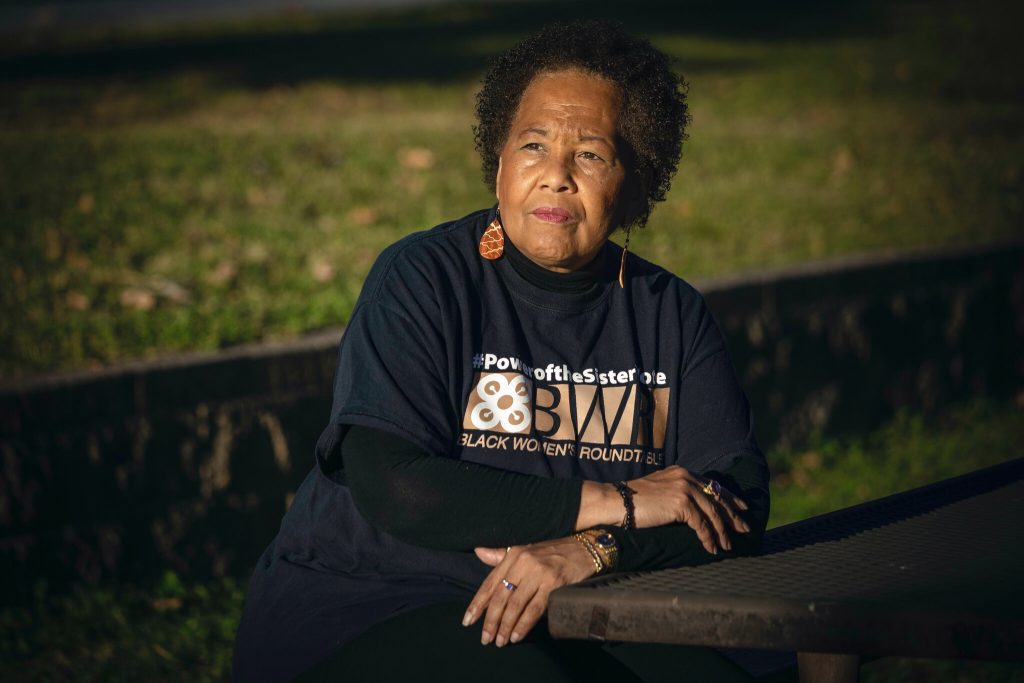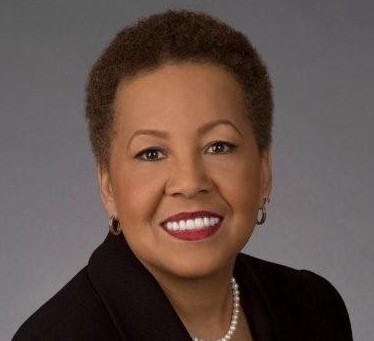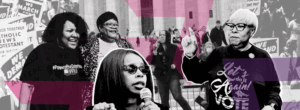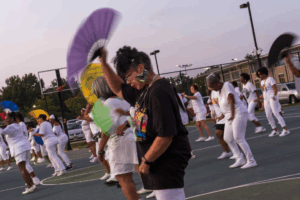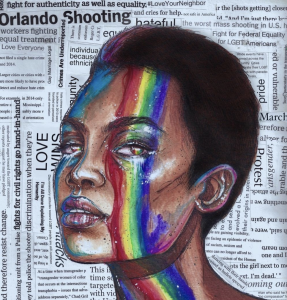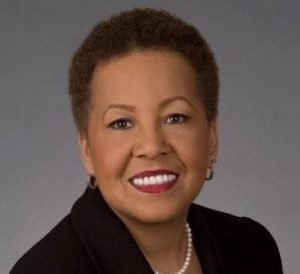 Felicia Davis, author.
Felicia Davis, author.
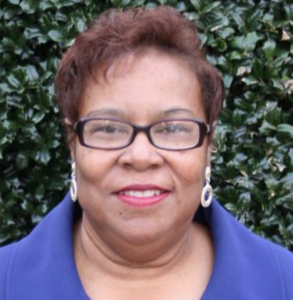 Helen Butler, author.
Helen Butler, author.
Helen Butler, author. By Felicia Davis, HBCU Green Fund Managing Director & Clayton County BWR Convener; Helen Butler, The Georgia Coalition For The Peoples’ Agenda Executive Director. Cover photo by Audra Melton for The New York Times.
Originally published in the Black Women’s Roundtable Report, 2021.
Black women in Georgia have been working for decades to turn out the vote. Almost 50 years ago, Black women were instrumental in the election of Maynard Jackson as the first Black mayor of Atlanta, and Jimmy Carter would never have left Georgia without the strong support of Black women educating and mobilizing Black voters. The 2000 Census sheds light on emerging demographic shifts in Georgia that accelerated in 2010. The high-profile campaign of Stacey Abrams in 2018 confirmed that Georgia was changing, creating new possibilities. Black women understood that the 2020 Census would reveal major changes in the makeup of suburban counties, setting the stage for a wider and deeper mobilization of Black voters.
The Georgia Black Women’s Roundtable is a coalition led by Helen Butler, executive director of the Georgia Coalition for the Peoples’ Agenda; Deborah Scott, executive director of Georgia Stand Up; and Felicia Davis, managing director of the HBCU Green Fund and convener of the Clayton County BWR. The trio serve as co-conveners of the Georgia BWR, sharing areas of intersection, as well as distinctive issue expertise, enabling a strong issue-driven outreach in metro Atlanta and in Black areas throughout Georgia. With early support from the national office, Georgia BWR was positioned to significantly increase outreach to potential Black voters for the General Election. The additional resources were especially critical given the adjustments required due to COVID-19.
The Georgia 2020 voter empowerment effort launched with the theme “R U Vote Ready?” The first goal was to make sure voters understood that absentee voting was secure and to make sure that voters checked to make certain that they were registered. Touching and serving are hallmarks of the BWR community engagement. All Georgia BWR organizations conducted strategic phone banking, and Georgia Stand Up expanded their signature call center with the capacity to reach statewide. Stand Up made more than a million calls supporting absentee, early and in-person voting in advance of the November election.
The Georgia Coalition for the Peoples’ Agenda (GCPA) is widely recognized as the anchor organization for voting rights advocacy in Georgia. GCPA has expanded to seven offices throughout Georgia, including Albany, Athens, Augusta, Columbus/LaGrange, Macon, Savannah and Metro Atlanta. Each office has a local coordinator knowledgeable about the areas that they serve.
GCPA employed a COVID safety director to ensure that all activities met rigorous standards for masks, social distancing, surface cleaning and sanitizing. Additionally, regular testing was a requirement for workers, and temperatures were checked daily. GCPA also assembled and distributed more than 25,000 PPE kits that included a mask, water, a snack, and GOTV literature.
GOTV by the Numbers
GCPA hosted at least two statewide Zoom meetings every week where issues were discussed, and all candidates were invited to share their platform with the audience. Understanding that it can take more than one touch to motivate potential voters, and given the heightened concern over COVID, emphasis was placed on reaching voters at home. GCPA utilized earned and paid media, including print, radio and social media to provide accurate information about absentee and early voting. Emphasizing personal contact, GCPA conducted 16,807 phone conversations, sent 839,976 text messages, mailed 651,999 pieces of literature, knocked on more than 100,000 doors and provided 400 rides to the polls to achieve a turnout rate of 61.01% in the General Election and a remarkable 60.84% in the Senate Runoff, a full twenty points above the statewide average of 40.46%.
GCPA logged 944,965 voter contacts and of those contacted 574,901 voted for a conversion rate of 60.84%. Fully 97% of those contacted were People of Color, and the majority were Black. More Black women were contacted, and their turnout rate was more than 10% higher than their male counterparts.
Getting voters to the polls is critical and making certain that once they arrive, they can cast a ballot is equally important. To ensure that voting rights are not violated and to contribute to a free and fair election, GCPA recruited 800 poll workers and trained 1300 Election Protection poll monitors covering 93 Georgia counties and well over 600 precincts. This work helps to dissuade, catch, resolve, and document problems encountered.
The National Coalition on Black Civic Participation was the only national organization to target funds specifically for Clayton County, a large predominantly Black suburb of Atlanta. Clayton County BWR is unique in that the focus is on a single county, but the full force of the Georgia
BWR was brought to bear in Clayton County. Employing some 50 workers from the IATSE Local 834, every door was knocked at least once for the General and twice for the Runoff Elections. Clayton County BWR distributed doorhangers across all seven cities in the County. On November 3rd it was Clayton County that put the Biden/Harris ticket over the top and sent the two Georgia senate races to runoffs, shocking the nation.
It was hard work together with strategic targeting that made the difference. Georgia BWR combined data analytics with grassroots organizing expertise, maximizing and leveraging all available resources. BWR worked in collaboration with numerous coalition partners to knock on every door, call and/or text every phone, hold out of the box events like motorcycle rallies, food truck mini gatherings, park events and celebrity rallies. Nonpartisan candidate and issue forums were held online and reinforced with canvassing and phone banking. Georgia BWR coordinated with other women-led, voter engagement organizations active in Georgia including Black Voters Matter, Fair Fight and the New Georgia Project among others.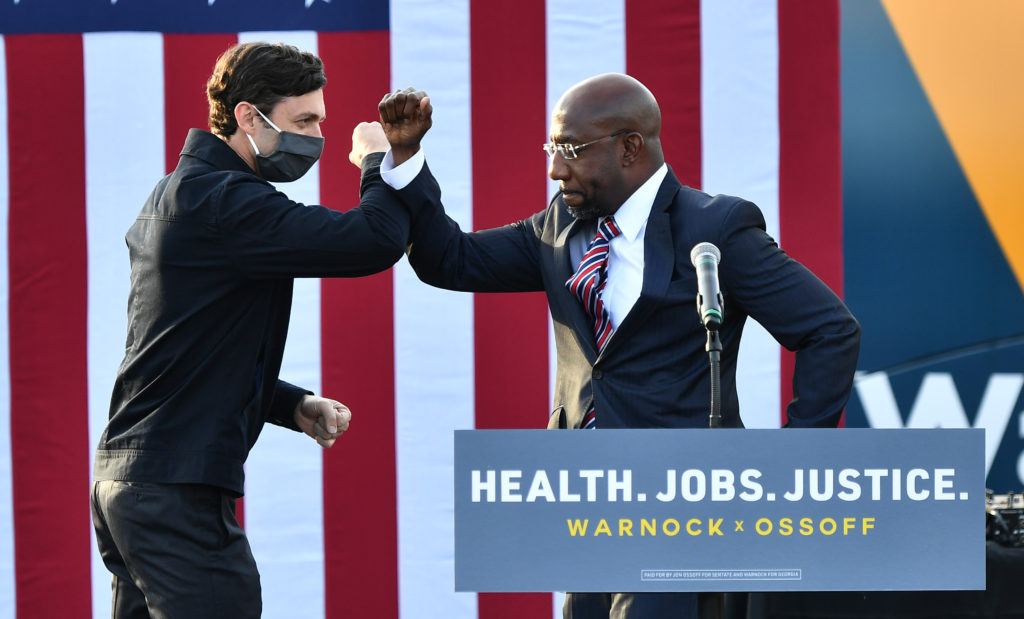
On January 20, 2021, Jon Ossoff (left) and Rev. Raphael Warnock (right) were sworn in as the first Jewish and first Black people, respectively, to represent Georgia in the United States Senate.
SENATE RUNOFF 2021
In addition to funding, BWR conveners from around the nation were activated to assist, vastly multiplying the impact in Georgia. Phone banking was underway from BWR call centers in Michigan and Pennsylvania. Social media was utilized for the General Election, but it was maximized for the runoff. BWR sisters across the South turned up with energy from Florida, Alabama, Louisiana and Mississippi. The DMV added in issues like paid family leave and fight
for fifteen helped inspire turnout. Georgia BWR was also an active participant in the Win With Black Women collaborative that mobilized celebrity support ranging from Kerry Washington and Oprah to Maxwell and John Legend. The NCBCP comms team helped to maximize media coverage, reinforcing local efforts by DogonMedia.
GCPA coined the slogan, “Let’s Do It Again” and more than 1000 signs were posted in Clayton County alone along with “Stand Up and Vote” signs throughout Metro Atlanta and beyond. The resources that seemed to be pouring into Georgia were needed to overcome an election during the Christmas holiday when large segments of the population were unemployed and the coronavirus was spiking. BWR conveners worked closely with rank-and-file members of Georgia labor unions, civil rights and civic organizations. With less time than in the General Election and in spite of all of the very real challenges, Georgia BWR produced remarkable numbers, more than doubling the number of voter contacts.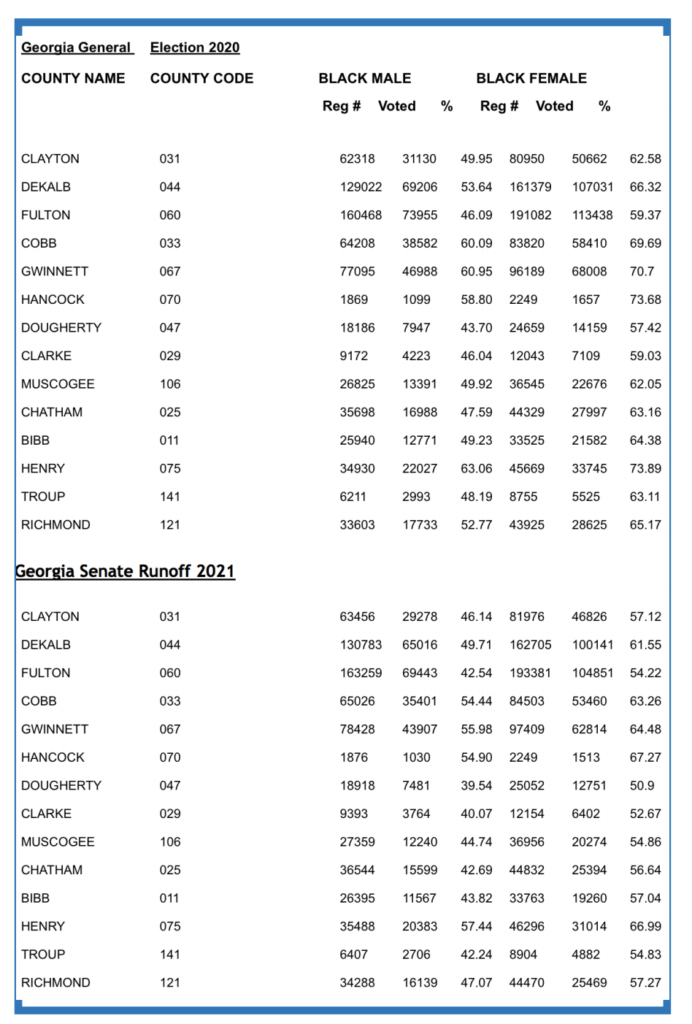
“A review of turnout in counties with high numbers and percentages of Black voters explains the Biden/Harris and Warnock/Ossoff victories.”
Black voter turnout was strong, particularly among women. Rigorous voter engagement resulted in Runoff turnout closely approximating that of the General, overcoming the typical falloff when presidential candidates are no longer on the ballot.
A review of turnout in counties with high numbers and percentages of Black voters explains the Biden/Harris and Warnock/Ossoff victories. It also illustrates the potential for changing the Georgia political landscape and signals possibilities for other states, particularly southern states. The fact that the Black vote is credited with “flipping Georgia from red to blue” sent shock waves that reverberate across state legislatures. One scholar refers to the current assault on ballot access as, “The Empire Strikes Back” given the draconian bills introduced and passed by the Republican majority in the Georgia legislature. These voter suppression tactics will rollback access with the obvious intent to disenfranchise voters of color.
Georgia Black Youth Vote, co-led by two young women and one male, worked hard to mobilize their peers to vote. These young organizers mobilized a national Stand With GA virtual march protesting voter suppression bills. They are committed to working for the long-haul and determined to increase voter participation and ultimately expand voter access. Working together, Georgia Black Women’s Roundtable and Georgia Black Youth Vote are determined to increase Black voter turnout in 2022 no matter the obstacles from the legislature.

